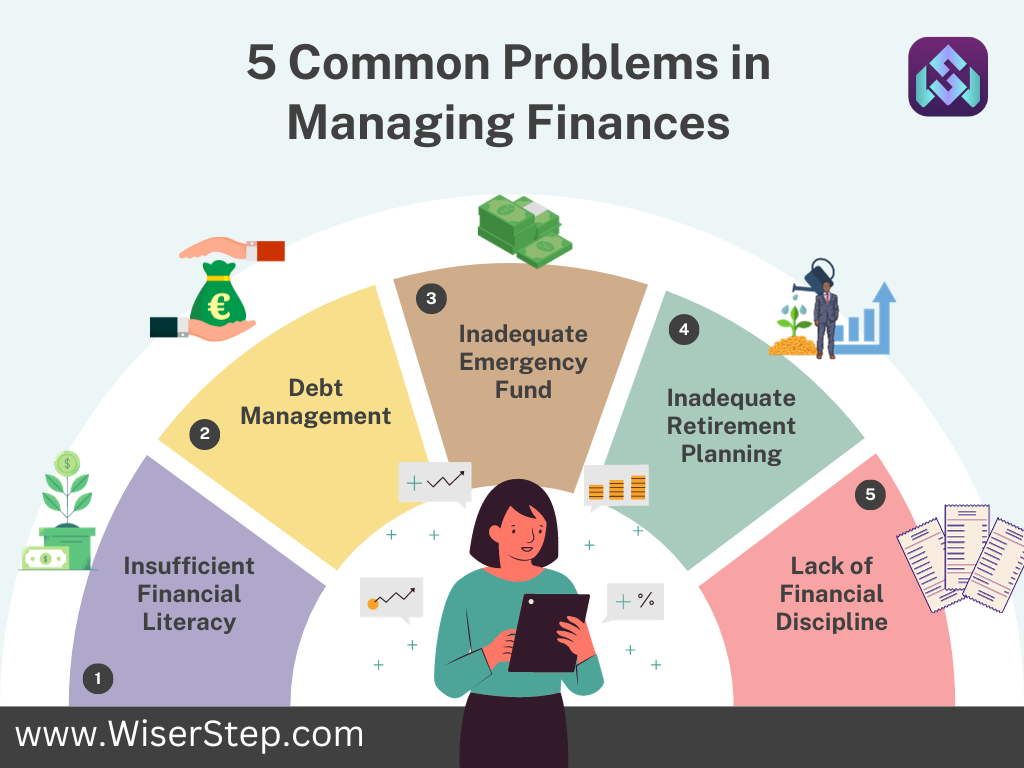Managing finances is a vital aspect of adult life, yet it’s a responsibility that often comes with a fair share of challenges. Whether you’re a recent graduate, a young professional, or someone with years of experience, financial management can be a daunting task. In this blog post, we will explore five common problems that individuals often face while managing their finances and offer insights into how to overcome them.
Insufficient Financial Literacy
One of the primary challenges in managing finances is the lack of financial literacy. Many people are not adequately educated about budgeting, saving, investing, or understanding complex financial products. Without this knowledge, individuals may struggle to make informed decisions, leading to poor financial choices and, in some cases, substantial debt.
Solution: The solution lies in education. Taking the time to learn about personal finance through books, online courses, or workshops can significantly enhance your financial literacy. Additionally, consulting with financial advisors or experts can provide personalized guidance tailored to your specific needs and goals.
Debt Management
Debt, whether from student loans, credit cards, or mortgages, is a significant challenge for many individuals. High-interest debts can quickly accumulate, making it difficult to pay them off, impacting overall financial stability. Failure to manage debt effectively can lead to a cycle of borrowing and struggling to make ends meet.
Solution: Creating a structured debt repayment plan is essential. Start by prioritizing high-interest debts and focus on paying them off first. Additionally, consider debt consolidation to reduce interest rates and streamline payments. It’s crucial to curb unnecessary expenses and allocate extra funds toward debt repayment. Seeking guidance from credit counseling services can also provide valuable strategies for managing and reducing debt.
Inadequate Emergency Fund
Unexpected expenses, such as medical emergencies, car repairs, or job loss, can strain finances significantly. Without an adequate emergency fund, individuals are forced to rely on credit, exacerbating debt issues. Building an emergency fund is often neglected due to competing financial priorities.
Solution: Establishing an emergency fund should be a top priority. Aim to save at least three to six months’ worth of living expenses in a separate, easily accessible account. Start small if necessary but be consistent. Automate regular contributions to the fund to ensure steady growth. Having a financial safety net provides peace of mind and prevents falling into a financial crisis during unexpected situations.
Inadequate Retirement Planning
Many individuals underestimate the importance of planning for retirement, especially in their early years. Delaying retirement savings can lead to insufficient funds during retirement, causing financial stress in the later stages of life. With increasing life expectancy, ensuring a comfortable retirement becomes more critical than ever.
Solution: Start saving for retirement as early as possible. Take advantage of employer-sponsored retirement plans, such as 401(k) or pension schemes, and contribute regularly. Consider diversifying investments and seek guidance from financial advisors to create a tailored retirement plan. Regularly review and adjust your retirement savings as your income and financial goals change over time.
Lack of Financial Discipline
Impulse spending, lack of budgeting, and failure to stick to a financial plan are common issues faced by many individuals. Without discipline, it’s challenging to achieve financial goals and build wealth steadily.
Solution: Cultivating financial discipline requires conscious effort and commitment. Start by creating a realistic budget that outlines your income, expenses, savings, and debt repayment. Track your spending habits and identify areas where you can cut costs. Set clear financial goals and establish a timeline for achieving them. Regularly monitor your progress and make adjustments as needed. Consider using budgeting apps or tools that can help you stay organized and accountable.
In conclusion, managing finances is a journey that requires education, discipline, and strategic planning. By addressing these common challenges with knowledge, determination, and proactive steps, individuals can overcome financial hurdles and achieve long-term financial stability and prosperity. Remember, seeking support from financial professionals and staying committed to your financial goals are key steps toward a secure financial future.

